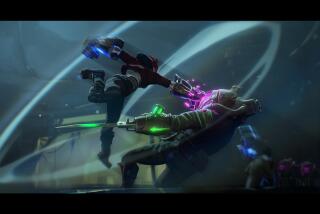Hackers find key to DVD piracy
- Share via
The much-vaunted anti-piracy protection on the next generation of DVDs has been cracked, leaving films in the new high-definition formats vulnerable to copying.
Hackers have defeated the core means for protecting the medium seen by Hollywood as a major new source of revenue as growth of traditional DVDs has slowed.
An underground programmer this month released code on the Internet that would free some high-definition DVD movies from their digital handcuffs if a consumer also had a software key for that particular video.
On Thursday, backers of the anti-piracy technology confirmed that those keys were being posted on the Internet. Late in the day, keys for 35 titles, including “King Kong” and “World Trade Center,” were available.
“Such unauthorized disclosures indicate an attack on one or more” of the high-end video players that use the anti-piracy technology known as AACS, for Advanced Access Content System, according to the website of the consortium of home-electronics, technology and entertainment companies backing the encryption system.
Copies of the pirated movies are flowing over file-swapping networks. AACS is the biggest part of the digital defenses for the two rival high-definition DVD formats: HD DVD and Blu-ray. These are expected one day to replace conventional DVDs.
Sales of both types of discs accelerated before Christmas, when the first Blu-ray players entered the market and new HD DVD players arrived as well. The players are expensive, at $399 and up, and film studios are just starting to release large numbers of titles at around $40 each.
These new discs offer dramatically improved picture quality and more interactive features.
AACS is controlled by entertainment firms including Walt Disney Co. and Time Warner Inc.; electronics makers including Sony Corp. and Toshiba Corp.; and technology powers Microsoft Corp., IBM Corp. and Intel Corp.
In its Web statement, the AACS group said the battle was far from over. Although it wouldn’t give specifics, the group said it would explore “technical and legal measures to deal with the attack.”
An executive at one of the member companies involved in the decision-making said the group might deactivate the model of player used in the hacking.
Although such a move would make life difficult for consumers and manufacturers, most studios have “grave concern that content is being unencrypted,” said the executive, who asked that his name not be used because the group had not reached a decision on what action to take.
It would be up to the manufacturer to decide how to update its players. It could mail out discs with updated software or offer a patch for downloading over the Internet.
Movies that have been unlocked and distributed would remain available for free viewing, but new titles would have enhanced protection, the executive said.
“This may continue for some time, but this type of attack is unlikely to happen again,” he said.
*
More to Read
The biggest entertainment stories
Get our big stories about Hollywood, film, television, music, arts, culture and more right in your inbox as soon as they publish.
You may occasionally receive promotional content from the Los Angeles Times.








